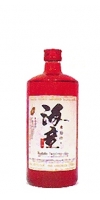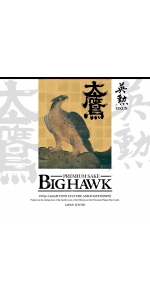Iwai (Sake)

Iwai rice is rice native to the region of Kyoto, Japan, and is only used by sake breweries. This variety cannot be purchased for use at home. In fact, the Eikun Brewery purchases roughly 40 percent of all Iwai rice grown and blends the rice with a fantastic water source in the region known as “Fusui.” Sake produced from this region blends perfectly with local cuisine and has a mild and soft flavor. Since locals do not use a lot of salt in their cooking, sake compliments the food nicely. Eikun sake is popular among fine Japanese restaurants because of its unique flavor and mild taste. The Iwai rice is a fantastic choice for this sake because it allows for deep polishing. The variety absorbs water very easily after the outer shell is shaved off. During World War II, the variety was no longer sowed due to a demand for rice varieties that produced high yields. It was not until the 1990s that the variety was planted and used for sake brewing. Rice used in sake brewing is different from rice used for food, since the rice must be able to absorb water easily. Rice used for quality sakes are twice the price of typical rice, which most breweries use for low-end sakes. Since the Iwai rice is one of the best varieties for sake, it is both expensive and not as readily available.
Rice milling: 60%
Rice varietal: Iwai (Only available in Kyoto)
Alcohol: 15%
Sake meter value: +3.0
Acidity: 1.3
Tasting Notes: --------
Eikun sake uses water from a source called "Fusui", rated as one of the top 100 sources of water in Japan. This water source is located just south of the ancient Japanese, and still cultural capital of Japan, Kyoto.
Review:
"Clear with a platinum blue cast. Aromas of coconut milk, melon, pear and rice pudding with a with a supple, dry-yet-fruity medium body and a vanilla, apple, and pepper accented finish. A robust and lively sake that will sing with spicy Asian cuisine."
- Beverage Testing Institute (July 2nd 2014), 91 pts
- back
Selected Options
Grape Types
Categories
Pricing
Countries
Regions
Grape Types
Wineries
Organic/Free Shipping
All older vintage wines have been purchased from a single collectors cellar. Pictures can be requested before shipment.
Thorn Clarke Terra Barossa Cabernet Sauvignon is made from 100% Cabernet Sauvignon
The range is named is named in honor of the rich soils in the region which are a major factor in the Barossa’s reputation as one of the great wine regions of the world.
The wine shows a bright red with a purple hue on release. Lifted blackcurrant balances the fresh herb characters on the nose. A hint of eucalyptus is evident. The palate has bright currant characters throughout. Spice and chocolate add to the complexity of the wine. The tannins are ripe and grainy and give the wine good structure.





